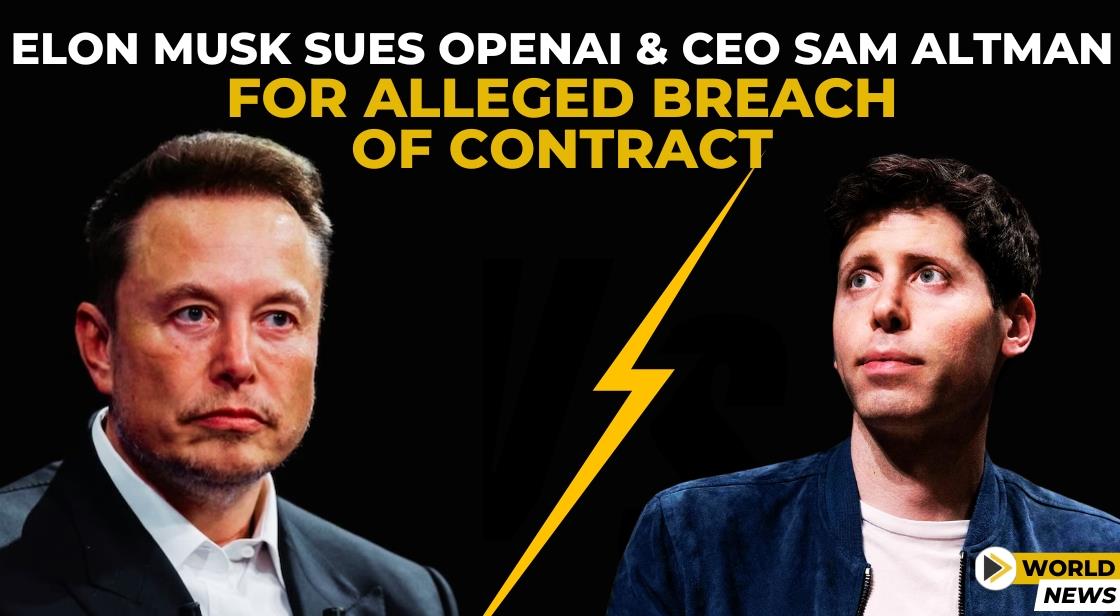Elon Musk Sues OpenAI and CEO Sam Altman for Alleged Breach of Contract

News Synopsis
In a startling development, Elon Musk has filed a lawsuit against OpenAI and its CEO, Sam Altman, among others, alleging a breach of contractual agreements dating back to the establishment of the organization in 2015. Musk contends that the non-profit entity, originally conceived for the altruistic advancement of artificial intelligence (AI) for humanity's benefit, has deviated from its initial mission.
Background of the Lawsuit:
The legal documents reveal that OpenAI CEO, Sam Altman, along with OpenAI co-founder Greg Brockman, initially approached Musk to create an open-source entity dedicated to the development of AI technology for societal betterment. However, Musk's legal representatives argue that OpenAI's recent pivot towards profit-driven ventures contradicts the terms of the original agreement.
A Shift from Non-Profit to Profit-Seeking?
The lawsuit centers around accusations of a breach of contract. According to legal documents, Musk claims that OpenAI, initially envisioned as a non-profit organization, has deviated from its original purpose of promoting beneficial AI development for the public good.
Musk's legal team contends that OpenAI's recent shift towards profit-driven ventures and commercialization efforts contradicts the initial agreements and collaborative spirit upon which OpenAI was founded.
Musk's Role and Stance:
Elon Musk, who played a pivotal role in founding OpenAI in 2015 but stepped down from its board in 2018, is known for his involvement in groundbreaking ventures such as Tesla and the acquisition of Twitter for a staggering $44 billion in October 2022.
Context Amidst ChatGPT's Rise:
The legal dispute unfolds against the backdrop of ChatGPT's unprecedented success. OpenAI's flagship chatbot swiftly became the world's fastest-growing software application within six months of its November 2022 launch. This success not only transformed the landscape of conversational AI but also triggered a competitive wave, with tech giants like Microsoft and Alphabet, as well as numerous startups, racing to introduce their generative AI solutions.
ChatGPT's Impact and the Rising Competition
Beyond its popularity, ChatGPT has demonstrably impacted diverse industries, demonstrating its potential in various tasks ranging from document summarization to code generation. This success has undeniably fueled the ongoing competition within the tech sector, as companies strive to develop and deploy their own cutting-edge generative AI solutions.
The outcome of this lawsuit remains to be seen, but it has undoubtedly sparked discussions and raised questions about the evolving landscape of artificial intelligence, the challenges of balancing innovation with ethical considerations, and the potential for conflicts between foundational principles and commercial realities.
Conclusion
The lawsuit between Elon Musk and OpenAI raises critical questions about the evolving nature of artificial intelligence development. While the legal battle unfolds, several key points deserve consideration:
-
The Future of OpenAI: The lawsuit casts a shadow of uncertainty over OpenAI's future direction. Whether the organization chooses to prioritize its original non-profit goals or pursue a more commercially driven approach will be a crucial decision with broad implications.
-
Ethical Considerations in AI Development: This case highlights the ongoing discourse surrounding the ethical considerations in AI development. Balancing the potential benefits of AI with the risks associated with its commercialization and potential misuse remains a significant challenge.
-
Impact on the Broader AI Landscape: The outcome of this lawsuit could potentially impact the broader landscape of AI development. It might influence how other organizations and individuals approach the ethical and financial considerations involved in this field.
Moving forward, it will be crucial to monitor the legal proceedings and their ultimate resolution to gain a clearer understanding of how this case will shape the future of OpenAI and contribute to the ongoing dialogue on responsible and ethical AI development.
You May Like









